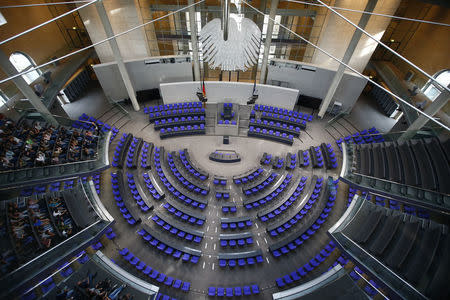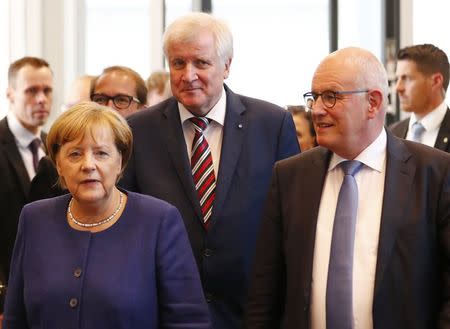The new risk for Europe - an inward-looking Germany
By Noah Barkin BERLIN (Reuters) - In 2008, in a fit of pique over Angela Merkel's cautious response to the global financial crisis, the French president, Nicolas Sarkozy, lashed out at his German counterpart. "While France is acting, Germany is just thinking about it," Sarkozy seethed. Nearly a decade later, after an election that has weakened Merkel and vaulted a new far-right party into the German parliament, European fears of a risk-averse, inward-looking Germany are back. "If you are sitting in other European capitals, you are watching nervously," said Robin Niblett, director of the Chatham House think tank in London. "Merkel's room to take conciliatory positions, to play a leadership role and to move Europe forward has narrowed." Back in 2008, the complexity of the fast-moving financial crisis and an aversion to big stimulus measures made Merkel cautious. This time, domestic politics is the driver. At a time when new French President Emmanuel Macron is pressing Merkel to work with him to reshape Europe and Brexit negotiations with Britain are nearing crunch time, the German chancellor faces months of difficult coalition negotiations that could lead to a dead-end. If she is able to cobble together a three-way coalition with the business-friendly Free Democrats (FDP) and environmentalist Greens -- her only option for now -- it would almost surely be a less stable construction than her current government. This new coalition would have to cope with a more confrontational opposition in the Bundestag, led by Merkel's bitter outgoing partner, the Social Democrats (SPD), and the disruptive Alternative for Germany (AfD), the first far-right party to sit in parliament in over half a century. The weakness of Merkel's conservative bloc -- its score of 32.9 percent was the lowest since 1949 -- and the strength of the AfD is a result of her decision in 2015 to allow hundreds of thousands of refugees into Germany. That has hurt her standing within her own party and spooked her Bavarian allies, the Christian Social Union (CSU), who bled support to the AfD in Sunday's vote. The CSU is likely to be an even more difficult partner for Merkel than the FDP and Greens. "Merkel presided over the entry into the Bundestag of an extreme right wing party and that is an indictment of sorts. It has weakened her, without a doubt," said Niblett. NOT GOING AWAY Europe's political establishment entered 2017 concerned that the populist tsunami that led to Brexit in Britain and Donald Trump's election win in United States would sweep over the continent. Instead, the Dutch backed liberal incumbent Mark Rutte over far-right firebrand Geert Wilders and the French chose the unabashedly pro-European centrist Macron over Marine Le Pen. In Germany on Sunday, the political centre also held. Parties of the centre-right and centre-left won over 73 percent against roughly 22 percent for the far-right AfD and hard-left Linke. But the vote was also a reminder to Europe that the populists are not going away. And it exposed cracks in the "pillar of stability" that Germany and Merkel have come to represent in perhaps the most challenging decade for Europe since World War Two. "The German election was a double blow from a European perspective," said Pascal Lamy, the former head of the World Trade Organisation (WTO). "On the one hand, Merkel who has come to exemplify stability, has emerged politically weakened. On the other, anti-European forces have gained." Some people in Berlin and other capitals are describing the result as the beginning of the end of the Merkel era. Although she pledged on Monday to serve a full four-year term, many expect her to hand over to a successor in two to three years. Carsten Brzeski, chief economist for Germany at ING, said on Monday that the election result could turn Merkel into a "lame duck" much faster than anyone anticipated. Officials in Paris and other capitals suggested the next big European reform may have to be done without her. Others expressed concern about the direction Germany could take in the post-Merkel era. BIG RISKS Those fears are probably overdone. Merkel is a survivor who is at her best when mediating between different camps, as she will have to do over the coming months if she wants to convince disparate parties like the CSU, Greens and FDP to work together. While agreeing a reform of the euro zone with Macron has become more challenging because of the FDP's hardline views, other priorities, such as European defence cooperation, may become easier with the Social Democrats (SPD) out of government, advisers to the French president note. Senior officials at the European Commission say months of German coalition talks could actually provide the space needed for Macron's ideas to gain traction. Still, the negotiations carry risks. After twelve years in power, Merkel has gained a reputation for smothering her coalition partners. The CSU and the SPD were the victims in Sunday's election. Four years ago it was the FDP, which was booted out of parliament for the first time in the post-war era after serving as her junior partner. This will lead all of her potential partners to push a hard bargain. "Failing to form a stable majority government would probably spell the end of (Merkel's) chancellorship. And, more broadly, it could usher in a new period of political chaos," former German foreign minister Joschka Fischer said in a Project Syndicate commentary on Tuesday. "No one should wish that on Germany – or on Europe." (For a graphic on German federal elections click - http://tmsnrt.rs/2h0NqCT ) (Additional reporting by Alastair Macdonald, Peter Maushagen and Robin Emmott in Brussels, Ingrid Melander and Marine Pennetier in Paris, Crispian Balmer in Rome; editing by Anna Willard)

 Yahoo News
Yahoo News 

